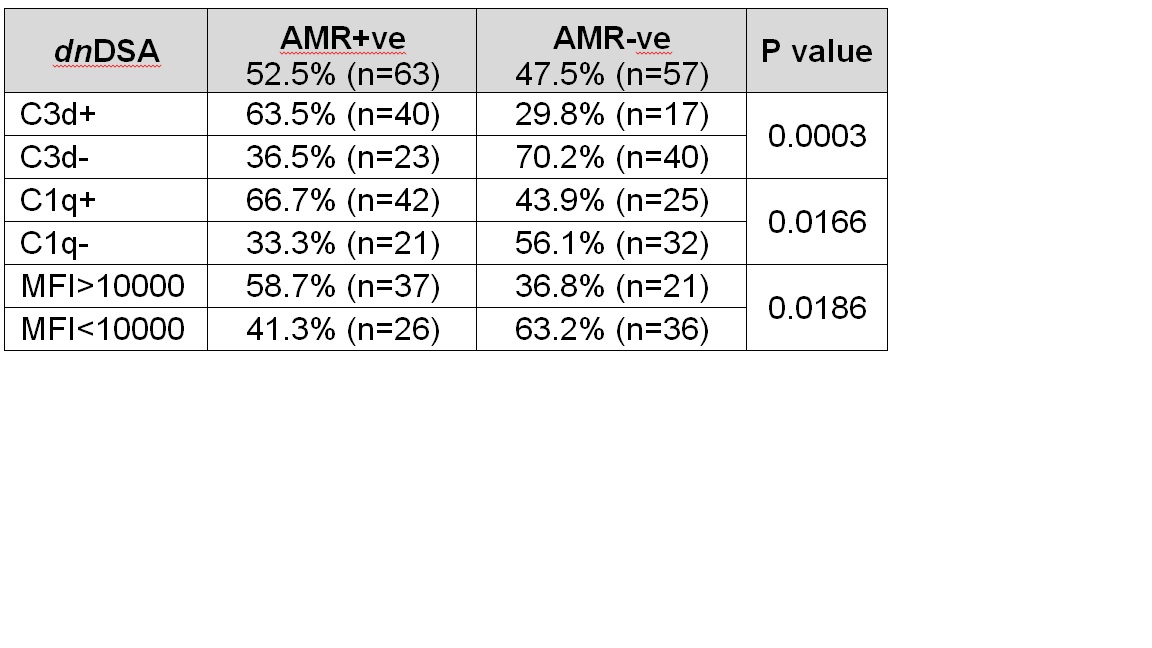Characterization of De Novo Donor-Specific HLA Antibodies and Correlations with C4d+ Antibody-Mediated Rejection of Kidney Transplants.
1Immunogenetics and Transplantation Laboratory, Depart. of Surgery, University of California San Francisco, San Francisco, CA
2Transplant Service, Department of Medicine, University of California San Francisc, San Francisco, CA
Meeting: 2017 American Transplant Congress
Abstract number: B70
Keywords: Biopsy, HLA antibodies, Kidney transplantation, Rejection
Session Information
Session Name: Poster Session B: Antibody Mediated Rejection in Kidney Transplant Recipients II
Session Type: Poster Session
Date: Sunday, April 30, 2017
Session Time: 6:00pm-7:00pm
 Presentation Time: 6:00pm-7:00pm
Presentation Time: 6:00pm-7:00pm
Location: Hall D1
Aim: Characteristics of de novo donor-specific HLA antibodies (dnDSA) that are associated with C4d positive antibody-mediated rejection (C4d+ AMR) in kidney transplants have not been well defined. We determined the nature of dnDSA, their capacity to bind complement components (C1q and C3d), and their correlation with biopsy proven C4d+ AMR in kidney transplant recipients.
Methods: Sera from 120 kidney transplant recipients (68 males; 14 re-Tx; 43 LD), who had dnDSA (by One Lambda single antigen beads) at the time of a protocol or for-cause kidney biopsy (median 3.8 yrs post-tx), were tested for C1q (One Lambda) and C3d (Immucor) binding dnDSA. Results were assessed using two-tailed Fisher's exact probabilities.
Results: Most of the recipients had a single DSA (53.3%) while 23.3% had 2 DSAs and 23.3% had >2 DSAs. Most of the DSA were directed against HLA class II (103/120; 86%). The strongest DSAs in most patients were directed to DQ antigens (80/120; 67%)  . Fifty-seven patients (48%) had C3d-binding dnDSA, and sixty-seven patients (56%) had C1q-binding DSA. Most of the C3d and C1q-binding dnDSA had high MFI (13932+5278 and 14144+5363, respectively) compared with the C3d/C1q-negative dnDSA (5970+3347).
. Fifty-seven patients (48%) had C3d-binding dnDSA, and sixty-seven patients (56%) had C1q-binding DSA. Most of the C3d and C1q-binding dnDSA had high MFI (13932+5278 and 14144+5363, respectively) compared with the C3d/C1q-negative dnDSA (5970+3347).
Sixty-three patients (52.5%) were diagnosed with C4d+ AMR (Table). Most of the C4d+ AMR patients had C3d (63.5%) and C1q (66.7%) binding dnDSA compared to the AMR negative group, and the differences were statistically significant. Furthermore, the patients with C3d and C1q-binding dnDSA had higher C4d scores on their biopsy.
Conclusions: Most dnDSA in kidney tx are directed against DQ molecules. There is a strong correlation between dnDSA with MFI>10000 and C3d/C1q-binding. The presence of C3d/C1q-binding MFI>10000 dnDSA is associated with a greater incidence of AMR. In addition, kidney recipients with high MFI/C3d/C1q-binding dnDSA had higher score of C4d deposition on the biopsy.
CITATION INFORMATION: Rajalingam R, Kopchaliiska D, Buenaventura O, Singh M, Tomlanovich S. Characterization of De Novo Donor-Specific HLA Antibodies and Correlations with C4d+ Antibody-Mediated Rejection of Kidney Transplants. Am J Transplant. 2017;17 (suppl 3).
To cite this abstract in AMA style:
Rajalingam R, Kopchaliiska D, Buenaventura O, Singh M, Tomlanovich S. Characterization of De Novo Donor-Specific HLA Antibodies and Correlations with C4d+ Antibody-Mediated Rejection of Kidney Transplants. [abstract]. Am J Transplant. 2017; 17 (suppl 3). https://atcmeetingabstracts.com/abstract/characterization-of-de-novo-donor-specific-hla-antibodies-and-correlations-with-c4d-antibody-mediated-rejection-of-kidney-transplants/. Accessed March 3, 2026.« Back to 2017 American Transplant Congress
